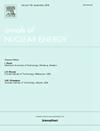Design and analysis of a nuclear heating system integrated with molten salt energy storage
IF 1.9
3区 工程技术
Q1 NUCLEAR SCIENCE & TECHNOLOGY
引用次数: 0
Abstract
Nuclear heating systems offer several advantages in centralized heating applications. However, its limited adaptation to rapid load changes requires extra heat sources to compensate for fluctuations. To address this issue, a nuclear heating system integrated with molten salt energy storage is proposed. Given that the heat load fluctuates periodically with outdoor temperature, molten salt is utilized to absorb excess heat from the nuclear heating system when the load is low. This stored heat is then released into the centralized heating network during periods of high load, compensating for load variations. In the design, a 200 MW system can heat about 70,000 m2 area without external sources and meet industrial supply needs. When the molten salt storage in the hot salt tank falls below approximately 300 m3, its economic efficiency exceeds coal-fired boilers. Molten salt peak regulation reduces the reliance of nuclear heating systems on external heat sources, establishing it as a viable option.
求助全文
约1分钟内获得全文
求助全文
来源期刊

Annals of Nuclear Energy
工程技术-核科学技术
CiteScore
4.30
自引率
21.10%
发文量
632
审稿时长
7.3 months
期刊介绍:
Annals of Nuclear Energy provides an international medium for the communication of original research, ideas and developments in all areas of the field of nuclear energy science and technology. Its scope embraces nuclear fuel reserves, fuel cycles and cost, materials, processing, system and component technology (fission only), design and optimization, direct conversion of nuclear energy sources, environmental control, reactor physics, heat transfer and fluid dynamics, structural analysis, fuel management, future developments, nuclear fuel and safety, nuclear aerosol, neutron physics, computer technology (both software and hardware), risk assessment, radioactive waste disposal and reactor thermal hydraulics. Papers submitted to Annals need to demonstrate a clear link to nuclear power generation/nuclear engineering. Papers which deal with pure nuclear physics, pure health physics, imaging, or attenuation and shielding properties of concretes and various geological materials are not within the scope of the journal. Also, papers that deal with policy or economics are not within the scope of the journal.
 求助内容:
求助内容: 应助结果提醒方式:
应助结果提醒方式:


